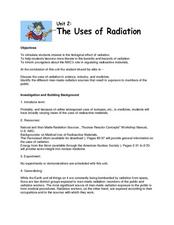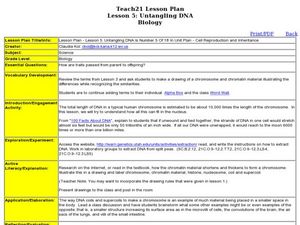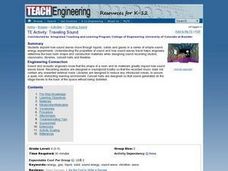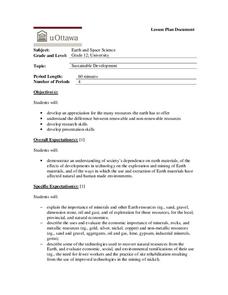Curated OER
The Uses of Radiation
No visual aids, no activities, and no demonstrations accompany this plan. What you will find, is background information for a short lecture on the use of isoptopic radiation in the medical field and in our everyday lives. Should you...
Curated OER
Pollutants on Coral
Students consider the effects of acid pollution on coral reefs. They brainstorm previous knowledge about coral reefs, examine a piece of coral and observe its reaction to acid and list ways we can prevent pollution from reaching the reefs.
Curated OER
Growing Up (And Around, and Down...) Exploring Plant Growth
Students build plant growing structures. In this plant growth lesson plan, students plant growth structures such as a garden tepee or a crawl through tunnel. They grow plants that are appropriate for the structure.
Curated OER
Lesson 5: Untangling DNA
Students extract DNA from split peas. In this biology lesson, students research how chromatin form into chromosomes. They draw the stages and present their work in class.
Curated OER
Traveling Sound
Students explore how sound waves move through liquids, solids and gases in a series of simple sound energy experiments. They describe how sound needs molecules to move and that changing the medium that it travels through changes the...
Curated OER
Electricity
Students examine basic electrical components. They build a simple electrical circuit which rings a buzzer. They experiment with conducting and nonconducting materials.
Curated OER
Scuba Diving
Students discover that scuba diving is more than a sport. It's a science that operationally integrates physics, chemistry, physiology, and oceanography. They perform a simple experiment which simulates the air tanks used in scuba diving.
Curated OER
Laws of Motions
Seventh graders explore the Laws of Motion. They define friction and explain the concept of inertia. Students explain what happens when a force is exerted on an object that is in equilibrium. They state the second and third laws of motion.
Curated OER
The Blizzard of 1993
Learners read and interpret the information from a barograph from a major winter storm. This task assesses students' abilities to interpret and analyze graphs, construct data tables and graphs, generalize, infer, apply knowledge of...
Curated OER
Beyond the Earth Part II
Students explore the solar system. In this solar system lesson, students use Internet and print resources to research a component of the solar system. Students create travel brochures based on their research findings.
Curated OER
What Does Sound Look Like?
Students work in small groups or individually to explore and edit an audio file. They identify beats and other features of waveform, find and remove silence in audio, experiment with fade and crossfade and export a clip they have completed.
Curated OER
What Plants Need
Students plant seeds in milk cartons, over the next two weeks, they watch the plants closely to see how they grow and change. They keep a photo journal to record the growth of the plant.
Curated OER
Animals
Second graders define and describe the characteristics of a mammal and a mammal's importance to man. They also describe the life cycle of a frog and compare and contrast a larva and an adult frog. Finally, 2nd graders study and explain...
Curated OER
Calculating Buttons
Students, after reading "The Button Box" by Margarette S. Reid, analyze real-world data by surveying a sample space. They predict the generalization onto a larger population utilizing calculators and computers. Students total categories,...
Alabama Learning Exchange
Tornadoes
Young scholars research tornadoes. For this weather lesson, students construct a KWL chart on tornadoes and view the video National Geographic-Tornadoes. Young scholars discuss the facts they learned from the film and complete the KWL...
Curated OER
Create a Cloud in a Jar (Hands-on Version)
High schoolers examine the conditions necessary for cloud formation. For this clouds lesson students complete an activity that shows them atmospheric pressure.
Curated OER
Sky and Cloud Windows
Young scholars monitor the weather, clouds, and sky. In this weather lesson, students create a sky and cloud window to focus their sky observations. They write observations in a notebook and include the date, time, cloud cover, types of...
Curated OER
The Magic School Bus Kicks Up a Storm
Young scholars investigate how warm air from a lamp affects a spiral of paper. They determine how the warm air rises while cooler air moves into take its place which creates wind in this Magic School Bus activity.
Curated OER
Locating Vent Fields Using CTD Data
Students describe the way hydrothermal vents work. Students work on locating vent regions through remote collection of data about water temperature and density. Comparing density and temperatures graphs, students search for indicators...
Curated OER
Matter: Build a Word
Fourth graders examine matter and the periodic table of elements. In this matter lesson, 4th graders discuss atoms and their composition. Students explore the periodic table of elements and use it to spell words out of the elements.
Curated OER
Behavior Of Substances At Different Temperatures
Fourth graders are involved in a lab experience to look at the concept of heating up various materials to see how they react to an increase in temperature. They make observations and record them in a lab journal. Then students discuss...
Curated OER
Sustainable Development
Twelfth graders explore the difference between natural and man-made environments. In this renewable resources lesson plan students evaluate the economic importance of resources.
Curated OER
Motion of a Bowling Ball
Students experiment with distance, speed, and motion by graphing the motion of a bowling ball. In this distance versus time graphing activity, students observe the speed and distance of a rolling ball and graph their findings. They then...
Curated OER
Measurement of the Depth of the Ocean
Learners comprehend the physical properties of pressure and Boyle's Law by designing a depth gauge. They construct a capillary depth gauge and calculate the calibrated depth marks of the capillary tube. They determine the margin of error...























